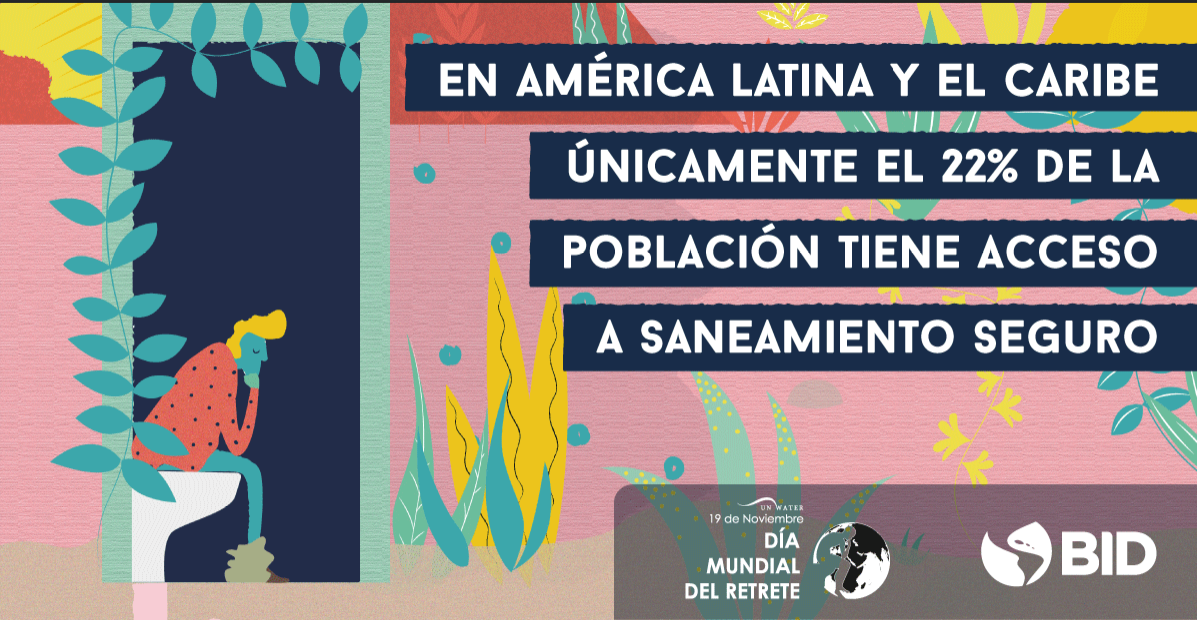November is a special month in the world of Toilets. Each November global stakeholders come together to shine a spotlight on a very important grand challenge – addressing the global sanitation crisis.
If there’s one thing that unites humanity, it’s the call of nature. But depending on where we live, it’s not always possible to dispose of our bodily waste safely and responsibly.
Have you ever thought about what happens to your poo once it drops into the toilet?
For billions of people, there is no safe toilet or sanitation service to take away the waste, allowing poo to get out into the open air where it’s spread by flies, making people ill. And even where there is some sanitation infrastructure, pipework can break or raw sewage can be emptied into the environment, contaminating farmland and water sources.
According to the WHO and UNICEF’s Joint Monitoring Programme (2017) – 85.72% of people in the LATAM Region currently have access to a toilet, but not all of that waste is then safely managed.
Dealing with our poo properly is not only about averting danger, it’s also about seizing an opportunity. Poo, safely treated and reused, has massive potential as an affordable and sustainable source of energy, nutrients and water. Sanitation systems also generate jobs and investment opportunities.
Our world of toilets is one abound with exciting new business and innovation opportunities, found in the places that no-one has been looking, virtually un-tapped, and with the potential to garner significant positive impact for society.
At the Toilet Board Coalition we call this THE SANITATION ECONOMY.
From our viewpoint, the potential is massive. In the Sanitation Economy, a perfect storm of reinvented toilet innovations; biological, renewable resource flows; data and information come together creating swells of new and valuable products, services and resources all around your toilet.
The Circular Sanitation Economy: Toilet resources can provide solutions for food, agriculture, water, energy and healthcare
When looked at through a Circular Economy lens, sanitation systems and our toilets, become an important pool of valuable resources. If what goes into our toilets is seen as valuable, those interested in extracting that value will invest in ensuring that the resource is properly managed – delivering important benefits to society.
7.6 billion people on the planet currently create Toilet Resources (also known as human excreta) everyday, to the tune of 3.8 trillion litres of resources (based on 500 L of excreta generated per person each year), and growing with our population growth. These resources, when mined, are revealing very interesting biological resource use cases.
Entrepreneurs and businesses are starting to monetise these resources and are creating valuable products such as nutrient rich organic fertilisers, electricity, bio-fuel, water, and proteins – previously, and in many cases still currently, flushed down our toilets. Our work has shown growing demand for these new renewable resources and organic or biological products from manufacturing operations and municipalities, to food, fibre, agriculture, animal feed, consumer goods and healthcare.
By 2030, the Sustainable Development Goals aim to reach everyone with sanitation, and halve the proportion of untreated wastewater and increase recycling and safe reuse. This World Toilet Day the United Nations has challenged us all to answer the question:
‘Where does our poo go?’
To achieve SDG 6, we need everyone’s poo to take a 4-step journey, follow below how one entrepreneur, Dr. Sasha Kramer, built her business SOIL to take care of all four steps for communities in Haiti.
- Containment: Poo must be deposited into a hygienic toilet and stored in a sealed pit or tank, separated from human contact. SOIL Toilets provide people with access to safe, dignified sanitation. SOIL is working to transform conditions in Haiti with both short-term projects that address critical needs and a long-term strategy to expand sanitation access through social business models.
- Transport: Pipes or latrine emptying services must move the poo to the treatment stage. SOIL collects waste and transports it to one of their waste treatment sites.
- Treatment: Poo must be processed into treated wastewater and waste products that can be safely returned to the environment. SOIL treats the waste through a carefully, lab tested process and transforms it into compost. Since building the first waste treatment facility in Haiti in 2009, SOIL has gone on to become one of the largest waste treatment operations in the country, treating thousands of gallons of waste each month.
- Disposal or reuse: Safely treated poo can be used for energy generation or as fertilizer in food production. SOIL produces an increasing quantity of Konpòs Lakay, SOIL’s EcoSan compost, each year. This compost is used to rebuild the productive potential of Haiti’s soils.
About the Toilet Board Coalition: The TBC is a business platform enabling private sector engagement; connecting large and small companies; and ensuring close collaboration between private, public and non-profit sectors with the common goal to accelerate the business of sanitation for all.
Founded in 2014, The Toilet Board Coalition was created by sector leading businesses to bring a business view, approach and new solutions to the global sanitation crisis. We aim to bring speed and scale, by working in partnership, to achieve universal access to sanitation before 2030.
Learn more about other inspiring entrepreneurs, and the Sanitation Economy at: www.toiletboard.org


Leave a Reply